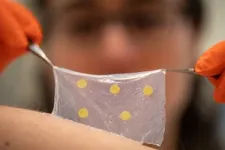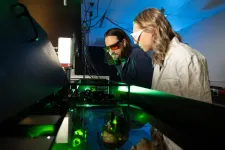(Press-News.org) ORLANDO, Fla. ― In a new study, researchers from The University of Texas MD Anderson Cancer Center created the largest single-cell atlas of brain metastases from renal cell carcinoma (RCC) with matched primary and extracranial metastases, enabling the discovery of key biological mechanisms driving an immunosuppressive tumor microenvironment in the brain distinct from that of the kidney or other metastatic sites. Findings were presented today at the American Association for Cancer Research (AACR) Annual Meeting 2023.
The study, led by Elshad Hasanov, M.D., Ph.D., medical oncology fellow at MD Anderson, provides further insights into how and why RCC, the most common type of kidney cancer, is more difficult to treat when it metastasizes to the brain compared to other sites. The data also point to several unique therapeutic targets that could be explored to improve the anti-tumor immune response.
“Brain metastases are, by far, the most challenging complication of kidney cancer. We’ve seen systemic therapies work in treating primary tumors and other metastatic sites, but they are not as effective for brain metastases. The current standard of care, radiation treatment and surgery, helps to treat the brain metastases but does not prevent new metastases,” Hasanov said. “We now see it’s not just because of the blood-brain barrier, but it also is due to interactions between the tumor and other immune and stromal cell populations, creating an immunosuppressive microenvironment in the brain that allows tumors to somehow escape immunotherapy.”
Many patients with RCC are treated with immune checkpoint inhibitors, but nearly 30% will eventually develop brain metastases as the progressing disease site. Due to poor treatment responses, patients with RCC brain metastases have a poor prognosis, underscoring a need to understand the mechanisms driving the brain as an immune-privileged organ that allows for tumor growth and spread even after immunotherapy.
Researchers at Emory University, Hacettepe University and MD Anderson collaborated to collect matched samples from primary kidney tumors as well as extracranial and brain metastases from patients who also underwent surgery. These consisted of frozen tissue samples from RCC patients, including 14 brain metastases, eight matched primary kidney tumors and five matched extracranial metastases. An additional 57 formalin-fixed paraffin-embedded (FFPE) brain metastases samples were included in the analysis.
The researchers performed single-nucleus RNA sequencing on nearly 200,000 cells to characterize gene expression within the samples. Using RNA spatial molecular imaging techniques, they mapped interactions between major cell types found in the tissues.
Tumor microenvironment of brain metastases has unique immunosuppressive features
Through their analysis, the researchers discovered that brain metastases had a strikingly immunosuppressive tumor microenvironment compared with primary tumors or extracranial metastases.
Brain metastases had greater infiltration of neuronal and glial cells, driving inflammatory responses that appear to suppress anti-tumor activity by binding with immune cells via known immunosuppressive ligand-receptor interactions. Brain metastases also had fewer proliferating T cells, memory B cells, dendritic cells and monocytes. Macrophages in the brain had more highly expressed immune-suppressing M2 gene signatures, which promote cell proliferation and repair.
Additionally, the brain metastases had higher activity of the VEGFR and FGFR4 growth-promoting proteins, higher levels of immune checkpoint proteins and an enrichment of various targets and pathways – including MYC genes – all of which allow the cancer cells to thrive in that microenvironment. Interestingly, the presence of naïve/memory T cells in the brain was associated with favorable overall survival after surgery, making this a potential prognostic marker.
Based on these results, Hasanov and colleagues plan to pursue further preclinical and clinical trials to test various combination therapies against VEGFR and FGFR4 (lenvatinib) and other identified targets in combination with immune checkpoint inhibitors (pembrolizumab) for patients with RCC brain metastases.
“There are communication highways between neuronal cells and other cell populations that do not exist in the kidney and other metastatic sites, but they are very dominant in the brain. It’s a whole other world with different tumor- and host organ-driven players and communications,” Hasanov said. The beauty of single-nucleus sequencing and spatial transcriptomics is that it allows us to look deeper and create snapshots of these cells and their location so we can better understand their biological value at the protein and RNA level. This helps us to identify potential therapeutic targets and to work toward designing therapies that can improve patient outcomes.”
The study was supported by the Kidney Cancer Association Young Investigator Award 2021, the International Kidney Cancer Coalition Cecile and Ken Youner Scholarship Award 2021, the Society for Immunotherapy of Cancer - NanoString Technologies Single Cell Biology Award 2022 and Cancer Prevention and Research Institute of Texas (CPRIT) (RP180684). Hasanov has received research funding to his institution from the Conquer Cancer Foundation, the Kidney Cancer Association, the International Kidney Cancer Coalition, and the Society for Immunotherapy of Cancer; honoraria from Targeted Oncology; and has served an advisory role for Telix Pharmaceuticals. A complete list of collaborating authors and their disclosures can be found here.
- 30 -
END
Coral reefs are more than just a vital part of the ocean. They can also reveal clues about the past. Analyzing coral skeletons can paint a rich picture of the environmental history of an ecosystem, from temperature variability to land-use changes.
On the U.S. Virgin Island of St. Croix, the ruins of a Danish sugar plantation built from harvested coral bricks could be the key to understanding how and why the area was decimated by the 18th-century transatlantic slave trade.
With funding from the National Geographic Society, researchers at the Georgia Institute of Technology and the University of California, Los Angeles (UCLA) will travel to ...
A nanocellulose wound dressing that can reveal early signs of infection without interfering with the healing process has been developed by researchers at Linköping University, Sweden. Their study, published in Materials Today Bio, is one further step on the road to a new type of wound care.
The skin is the largest organ of the human body. A wound disrupts the normal function of the skin and can take a long time to heal, be very painful for the patient and may, in a worst case scenario, lead to death if not treated correctly. Also, hard-to-heal wounds pose a great burden on society, representing about half of all costs in out-patient care.
In traditional wound care, ...
CLEVELAND—Even as biomedical engineer Anirban Sen Gupta refines artificial platelets to stem traumatic bleeding, he and his colleagues are seeking new uses for their synthetic solution.
The latest application to show promise involves providing synthetic platelets to treat a genetic condition that prevents blood from clotting, Von Willebrand disease (VWD). The most common of all bleeding disorders, VWD is found in up to 1% of the U.S. population (roughly 3 million people), according to the Centers for Disease Control and Prevention.
“There simply hasn’t been any study ...
Whether an animal is flying, running or swimming, its traveling speed is limited by how effectively it sheds the excess heat generated by its muscles, according to a new study led by Alexander Dyer from the German Centre for Integrative Biodiversity Research (iDiv) and the Friedrich Schiller University Jena, Germany published April 18th in the open access journal PLOS Biology.
An animal’s capacity to travel is a crucial part of its survival and dictates where – and how far – it can migrate, find food and mates, and spread into new territories. This becomes even more challenging in a human-dominated world ...
Tuesday, April 18, 2023, CLEVELAND: A Cleveland Clinic landmark study on obesity and cancer, led by Ali Aminian, M.D., director of Cleveland Clinic’s Bariatric & Metabolic Institute, was recognized with a 2023 Top Ten Clinical Research Achievement Award by the Clinical Research Forum (CR Forum). The award-winning paper, the SPLENDID study that was published in JAMA, also received an additional recognition as a Distinguished Clinical Research Awardee.
The Top 10 Clinical Research Achievement Awards honor groundbreaking achievements in ...
April 18, 2023—BRONX, NEW YORK – Type 2 diabetes (T2D) is surging among U.S. children. The number of youths under age 20 living with the disease has nearly doubled between 2001 and 2017, and yet—aside from increases in childhood obesity—the reasons for this disturbing increase are not clear. The National Institute of Diabetes and Digestive and Kidney Diseases (NIDDK), part of the National Institutes of Health (NIH), has awarded the Children’s Hospital at Montefiore (CHAM) and Albert Einstein College of Medicine a six-year, $4.1 million grant to ...
Is it possible to improve the antibodies that the body produces to fight SARS-CoV2? In a study led by researchers from Lund University in Sweden, this was investigated by redesigning antibodies and combining them against the virus. The modified antibodies have been tested in human cells and with mice.
Many antibodies used to treat covid infection during the pandemic have been so-called neutralizing antibodies that prevent the virus from infecting the cell. But as the virus has mutated, the ability ...
Firms that have their roots in selling non-physical digital products, also known as “born digital firms,” can establish an international presence without ever physically setting foot in another country. But experience shows that many born digital firms are still choosing to establish a physical presence—funded through foreign direct investments—in key markets.
A new study published in the Global Strategy Journal in February 2023 highlights the role of a physical presence in foreign markets for born digital firms. “Past research has indicated that digital technologies are highly fungible, which means that there is little relative gap in value when a resource ...
Solar power technologies, which use solar cells to convert sunlight to electricity or storable fuels, are gaining momentum in a world looking beyond fossil fuels for its energy needs.
The dark bluish solar panels that dot rooftops and open fields today are typically made from silicon, a well-tested semiconductor material. Silicon photovoltaic technology has its limitations, though, losing up to 40% of the energy it collects from sunlight in the form of heat waste. Researchers at Colorado State University are studying radical new ways to improve solar power and provide more options for the industry to explore.
CSU chemists are proposing to make solar cells using not ...
A Breakthrough for People and Planet: Effective and Inclusive Global Governance for Today and the Future, produced by the independent High-Level Advisory Board on Effective Multilateralism (HLAB), includes comprehensive and detailed recommendations to strengthen the global architecture for peace, security and finance, deliver just transitions for climate and digitalisation, and ensure more equity and fairness in global decision-making. It also argues that gender equality needs to be at the heart of a reinvigorated multilateral architecture along with recommendations to ensure the multilateral system is more networked, more inclusive and more effective.
Six transformational ...








